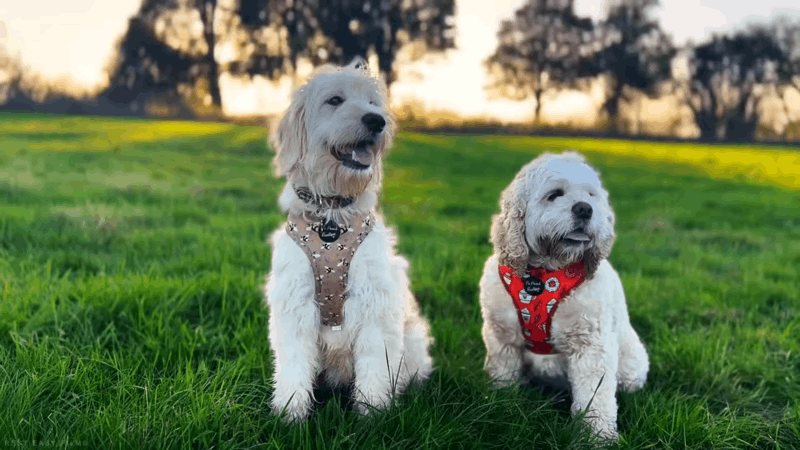No products in the cart.
Are you looking for a natural solution to help alleviate sundowners in dogs? CBD oil has gained attention for its potential benefits in managing sundowner syndrome symptoms in our canine companions.
In this blog, we’ll explore the potential of CBD for sundowners in dogs, discussing its effects, benefits, and important considerations for using dog CBD oil to support our four-legged friends with sundowner syndrome.
What is Sundowner Syndrome in Dogs?

Sundowner syndrome in dogs refers to a condition where older dogs experience increased confusion, restlessness, and anxiety as the day progresses and the sun begins to set.
Dogs with sundowner syndrome may exhibit behavioral changes, such as pacing, vocalizing, or becoming agitated, especially during the evening hours. Although this syndrome can be upsetting for both dogs and their owners, with the right management and care, its symptoms can be reduced to enhance the quality of life for the dog.
Symptoms of Sundowners in Dogs
Sundowners in dogs can be characterized by specific symptoms
- Increased confusion: Dogs with sundowner syndrome may display signs of confusion, disorientation, and difficulty recognizing familiar surroundings or people.
- Restlessness and agitation: Dogs may become more agitated, pacing or wandering, especially during the evening hours.
- Vocalization: Some dogs with sundowner syndrome may vocalize more frequently, whine, or bark excessively.
- Anxiety and fearfulness: When certain circumstances or environmental changes occur, dogs may display increased anxiety, fearfulness, or uneasiness.
- Sleep disturbances: Sundowners in dogs can disrupt normal sleep patterns, causing dogs to have difficulty falling asleep or experiencing interrupted sleep during the night.
It’s important to consult with a veterinarian if you suspect your dog is experiencing sundowner syndrome or any behavioral changes. They can help assess your dog’s condition, provide a proper diagnosis, and recommend appropriate management strategies to improve their well-being.
Differences Between Normal Aging and Sundowner Syndrome
The differences between normal aging and sundowner syndrome may vary by many factors. Here’s a table highlighting the differences:
| Feature | Normal Aging | Sundowner Syndrome |
| Behavior | Generally consistent throughout the day | Behavioral changes primarily in the evening |
| Confusion | Occasional forgetfulness, mild confusion | Increased confusion, disorientation |
| Restlessness | Minimal restlessness or pacing | Heightened restlessness, pacing, or agitation |
| Anxiety | Occasional anxiety or worry | Intensified anxiety, especially in the evening |
| Sleep Patterns | Slight changes in sleep patterns or quality | Disrupted sleep, difficulty settling at night |
| Triggering Factors | No specific triggers | Increased symptoms during sunset or darkness |
| Duration of Symptoms | N/A | Consistently observed during evening hours |
| Progression | Gradual and relatively stable over time | Symptoms may worsen or fluctuate |
It’s important to note that while sundowner syndrome can occur in older dogs, not all elderly dogs experience these symptoms. If you suspect sundowner syndrome in your dog, it’s best to consult with a veterinarian for a proper diagnosis and guidance on managing the condition.
Can Dogs Get Sundowners?

Similar to the syndrome in humans, sundowners in dogs can be characterized by confusion, restlessness, and increased anxiety during the evening hours. It is frequently seen in elderly dogs and can be upsetting for both the dog and its owners.
The Prevalence of Sundowners in Dogs
The prevalence of sundowners in dogs can vary, but it is commonly observed in older dogs, particularly those experiencing cognitive decline or age-related changes. While specific prevalence rates are not well-documented, it is believed to be a relatively common condition among senior dogs.
It’s crucial for pet owners to be aware of the potential sundowner syndrome signs and symptoms and to seek the proper veterinarian care and management techniques to assist their furry friends in coping with this ailment.
The Factors that Contribute to the Development of Sundowner Syndrome
The development of sundowners in dogs can be influenced by several factors, including
- Cognitive Decline: Older dogs experiencing cognitive decline are prone to sundowner syndrome. Age-related brain changes can cause confusion, disorientation, and evening anxiety.
- Sensory Changes: Diminished sensory perception, such as declining eyesight or hearing loss, can heighten confusion and anxiety in dogs during low-light or nighttime conditions.
- Environmental Factors: Changes in lighting or daily routines can disrupt a dog’s familiarity and routine, causing anxiety and restlessness, especially in the evening.
- Underlying Health Conditions: Dogs with medical conditions like cognitive dysfunction syndrome, neurological disorders, or pain-related issues are more susceptible to sundowner syndrome. These conditions contribute to its development or worsening.
- Stressful Life Events: Events like losing a companion, moving, or disruptions in routine can trigger or worsen sundowner syndrome symptoms.
If you suspect your dog is experiencing sundowner syndrome or cognitive dysfunction, it is advisable to consult with a veterinarian for a proper diagnosis and guidance on potential treatment options.
CBD Oil for Sundowning in Dogs: What Should I Consider?

CBD oil for sundowners in dogs shows promise as a potential solution for managing the symptoms associated with this condition. It is suggested that CBD may help reduce anxiety, promote relaxation, and improve overall well-being in dogs experiencing sundowning.
It is crucial to consult with a veterinarian knowledgeable in cannabis therapy and choose high-quality CBD products specifically formulated for dogs, ensuring appropriate dosages and close monitoring of your pet’s response.
Can CBD Oil Help with Sundowner Syndrome?
CBD oil has shown the potential in reducing anxiety, promoting relaxation, and improving overall well-being in dogs. These effects may help alleviate the symptoms associated with Sundowner Syndrome, such as restlessness and confusion. However, it is important to consult with a veterinarian experienced in cannabis therapy and carefully monitor your dog’s response to CBD oil. Each dog is unique, and the efficacy of CBD oil may vary.
Recommended Dosages and Precautions of CBD Oil for Sundowning in Dogs
Determining the appropriate dosage of CBD oil for dogs with Sundowner Syndrome can be challenging as there is no standardized dosage for this specific condition. It’s crucial to remember that CBD dosages might change depending on the dog’s size, weight, personal sensitivity, and the level of CBD in the oil.
When starting CBD oil for your dog, it is generally recommended to begin with a low dose and gradually increase it over time while monitoring your dog’s response. The ideal dosage range which pet owners should start with is 0.2 to 0.5 mg of CBD per kilogram of body weight and given one to two times per day.
However, it is crucial to consult with a veterinarian experienced in cannabis therapy for personalized advice based on your dog’s specific needs.
Additionally, it’s essential to choose high-quality CBD oil formulated for pets, as human CBD products may contain ingredients that are harmful to dogs. Always follow the manufacturer’s instructions and seek guidance from a veterinarian to ensure the safe and effective use of CBD oil for your dog with Sundowner Syndrome.
Tips and Strategies for Using CBD Oil to Help Alleviate Sundowners Syndrome Symptoms
When using CBD oil to help alleviate Sundowner Syndrome symptoms in dogs, here are some tips and strategies to consider:
- Consult with a Veterinarian: Before starting any CBD regimen, it’s crucial to consult with a veterinarian who has experience with cannabis therapy for pets. They can provide guidance on dosage, potential interactions, and help monitor your dog’s progress.
- Start with Low Dosage: Begin with a low dosage of CBD oil and gradually increase it if needed. Every dog is different, so finding the optimal dosage may require some trial and error. Starting low allows you to gauge your dog’s response and minimize the risk of adverse effects.
- Choose High-Quality CBD Oil: Select a reputable CBD oil product specifically formulated for dogs. Look for brands that provide third-party lab testing to ensure the product’s purity, potency, and absence of harmful contaminants.
- Consistency is Key: CBD oil may take time to build up in your dog’s system for optimal effects. Consistent and regular administration is crucial for sustained benefits. Follow the recommended dosing schedule and be patient while monitoring your dog’s response over time.
- Monitor Your Dog’s Response: Pay close attention to your dog’s behavior and symptoms while using CBD oil. Observe changes in anxiety levels, restlessness, and overall well-being. If you notice any adverse effects or no improvement, consult with your veterinarian to adjust the dosage or explore alternative options.
Remember, while CBD oil may help alleviate Sundowner Syndrome symptoms in dogs, it should not be a standalone treatment. It should be used in conjunction with other recommended therapies or medications as advised by your veterinarian to provide comprehensive care for your furry friend.
Is It Safe for Dogs to Use CBD Oil for Sundowning?

Using CBD oil for dogs with sundowning can be safe, but it’s crucial to consult with a veterinarian first. Even though CBD is often well tolerated by dogs, the right dosage and formulation may differ depending on the individual dog.
A veterinarian experienced in cannabis therapy can assess your dog’s specific needs, recommend a suitable CBD product, and determine the correct dosage. They will also consider any potential interactions with other medications your dog may be taking. By working closely with a veterinarian, you can ensure the safe and effective use of CBD oil for managing sundowners in dogs.
Conclusion
CBD oil holds potential as a natural option for managing sundowners in dogs, it may help reduce anxiety, promote relaxation, and support cognitive function. However, it’s important to consult with a veterinarian experienced in cannabis therapy for pets, start with low dosages, and closely monitor your dog for any potential side effects or adverse reactions.
Hello, I am Hazel Bennett, an experienced copywriter specializing in the fascinating topic of CBD for dogs. With a passion for pet wellness and extensive knowledge of CBD’s potential benefits, I am here to provide you with informative and engaging content.



